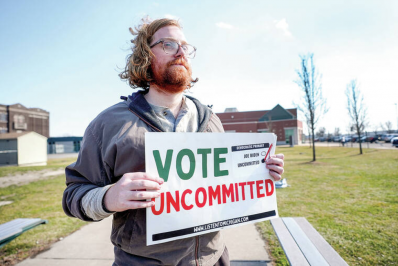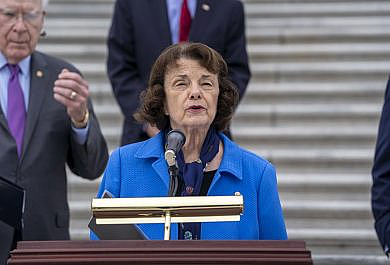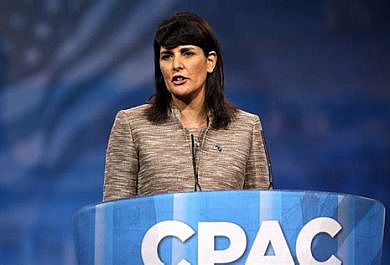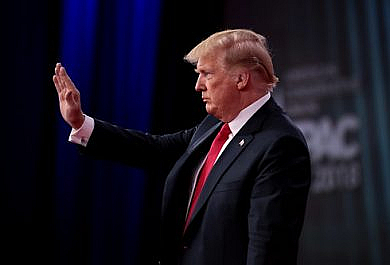President Joe Biden and former President Donald Trump both put up easy wins in the Michigan primary on Tuesday, yet warning signs abound for both frontrunners.
Summary
President Joe Biden and former President Donald Trump both put up easy wins in the Michigan primary on Tuesday, yet the protest votes against both frontrunners are indications that both men will have work to do to reassemble their coalitions before the general election.
- Trump handily defeated his lone remaining challenger, ex-UN Amb. Nikki Haley, by a 68.2% to 26.6% margin, a notable improvement compared to the South Carolina and New Hampshire contests.
- However, Haley’s command of a quarter to around 40% of the electorate, depending on the state, should be a concern to a Trump team that needs every single Republican vote, along with most independents and some Democrats, to prevail in November.
- Biden won 81.1% of the vote on the Democratic side, with 101,100 voters – good for 13.3% of the electorate – selecting “Uncommitted.”
- Progressive Democrats led by the “Squad’s” Rep. Rashida Tlaib urged voters to select “Uncommitted” to protest Biden’s support for Israel in its war against Hamas.
- The organizers of the anti-Biden protest set themselves a low bar of 10,000 voters, a metric they easily cleared.
- “Democrats were divided over how to treat the outcome, noting that Biden continued to dominate the primary in ways similar to, or even exceeding, past incumbents but also wary that significant pockets of discontent in the party could prove fatal in the general election,” Politico reported after the results came in.
![]()
- The New York Times’ Nate Cohn assessed the impact of the “uncommitted” vote on the general election. Cohn observed, “Having three in four Democratic primary voters in Arab American communities do it, on the other hand, is an eye-popping figure. It goes well beyond the norm, and it’s a powerful indication that the war in Gaza poses serious political risks to President Biden.”
- CNN’s takeaways from the Michigan primary results carried warning signs for all remaining candidates. CNN emphasized that the Michigan results make it likely that the end is near for the Haley campaign, while on the Democratic side “Minnesota Rep. Dean Phillips’ best hope was to avoid finishing fourth in a two-person primary.”
- “These uncommitted votes clearly signal something quite different — and potentially more troubling for the incumbent president — than those 2012 protest votes,” the Washington Post noted. “The real question is whether support can be marshaled in other states and in other ways to make Biden truly feel as if he needs to change his ways and mind his left flank.”
![]()
- “I’m doing what I think is right,” Haley told the Wall Street Journal when asked why she is continuing her quixotic presidential campaign. “I’m doing what I believe 70% of Americans want me to do,” she added, referring to polling that shows most Americans want a different option than a Trump-Biden rematch. “You have to see the writing on the wall, you have to see the hole in the ship,” Haley added, referring to the unbroken string of electoral losses – 2018, 2020, 2021, and 2022 – that the GOP has earned under Trump’s leadership of the party. “And if you don’t see the hole in the ship, we’re all going to go down.”
- The New York Post covered a new poll of Michigan voters conducted just before the primary. In the new Emerson College Polling / The Hill survey, Trump leads Biden by a 46% to 44% margin, with Trump leading with independent voters by 6 points. The race remains within the margin of error if third-party candidates are included, with Trump leading Biden 42% to 39% with Robert F. Kennedy Jr. pulling 6% of the vote.
- “Michigan’s Democrat-controlled legislature set the state’s primary date earlier than usual this year to comply with the wishes of the Democratic National Committee. But shifting the date for the Democrats pushed the Republicans out of compliance with the Republican National Committee (RNC),” Fox News observed. “To avoid a penalty from the RNC, Michigan Republicans came up with a split-primary system, with voters casting ballots on Tuesday and on March 2. On Saturday, the Michigan GOP will hold a party-run convention in Detroit. The winner of that contest could receive up to 39 delegates, although they will be distributed by district. There are 13 total districts and three delegates per district.”
© Dominic Moore, 2023






